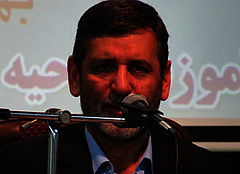Commander: Inappreciative Individuals Want to Curtail the Guards
» Tension Between Government and IRGC Continues
Two months have passed since President Hassan Rouhani talked about the dangers of institutions in which “intelligence, guns, money, capital, websites, newspapers and news agencies” are concentrated but the topic remains a key subject whenever Revolutionary Guard authorities talk in public. In the most recent such talk, a senior advisor to the top commander of the force referred to Hassan Rouhani as “inappreciative” without naming him directly, claiming that others wanted to “clip the wings of the Guards.”
During the fourth session of the seminar on “The Warriors of the Sacred Defense” (a reference to the 8-year Iran-Iraq war in the 1980s) Mohammad Hussein Saffar Harandi – an advisor to the top Guard commander - said, “The Revolutionary Guard force is authoritatively present in many fields. This sapling that was created by ayatollah Khomeini in the beginning of the revolution has now turned into a solid tree trunk which is present in different scientific, economic and development areas.”
This official continued, “Must we be accused of being corrupt to the bone if two individuals turn out bad?” Then without naming Rouhani, he said, “Some unappreciative individuals inside the country say that the feathers and wings of the Guards need to be clipped because it has become dangerous and because it possesses power, wealth and media outlets. Does the government itself not have these?”
According to him there are two distinct political-ideological strands in the country that confront each other: In one are individuals who believe that ayatollah Khomeini’s path can be continued and must continue while in the other are those who do not believe in this and have distanced themselves and are pessimistic.”
On December 8 of last year, during a seminar on combating corruption President Rouhani had said, “If guns, money, newspapers, websites and propaganda are concentrated in one place, there will definitely be corruption. So the world has learned to break up these powers.”
By stressing that “the concentration of power in one place brings corruption,” he added Division of power is for the purpose of controlling power and even our highest authority in the country, i.e., the supreme leader who is a just cleric works on the basis of the rules of the Experts Assembly which monitors the leader. The Experts Assembly was created during ayatollah Khomeini’s time who signed it into law so that there was supervision over every authority in the country as a way to prevent problems. We should create oversight for all situations to prevent corruption.”
He continued, “Even if priorities are changed from say building a road to constructing a dam, this would constitute corruption. So in the priorities of the plans and allocation of resources if fairness is not observed then this translates into corruption.”
While Rouhani did not call out any specific agency or institution by name, the Revolutionary Guards are the only institution in the country which has a military arm and is involved in economic and media activities. In recent years, the IRGC has created numerous news agencies, newspapers and websites. Since a few years ago it even created an intelligence agency of its won which parallel’s the country’s ministry of intelligence and this includes security activities.
The Revolutionary Guards force and its armed militia group the Basij have in recent years - especially since 2005 when Mahmoud Ahmadinejad became president – embarked on creating a bank, aggressively participate in oil and petrochemical bids, engage in the development of offshore and oil facilities, are active in hotel management, have bought spots clubs, telecommunication facilities, etc. as part of their economic activities in addition to receiving large funds under the military budget. The continuation of this massive participation and involvement in the country’s economic lifeline ex viewed to remain a major challenge for Rouhani in his presidential tenure.
The recent remarks by the cultural advisor to the IRGC come two months after Rouhani’s remarks of power concentration by the IRGC and corruption, during which time similar remarks by Guard authorities have filled newspaper headlines.
Immediately after Rouhani’s remarks the top IRGC commander told reporters that when he had asked the president about his remarks, Rouhani is said to have said that he did not have the IRGC in mind. But Guard officials continue to make references to the remarks, indicating that they and most likely the public interpret them to be directed at the force.
The continued controversy even forced Khabar Online website – close to Hussein Entezami, the press deputy of the Ministry of Islamic Guidance - to directly refer to “elevating the tensions between IRGC commanders and the government.” Guard General Yadollah Javani told Fars News Agency – affiliated to the Guards – that the West was pursuing a policy of discrediting the Guards and creating public phobia about it.
Hardline parliamentarian Ahmad Tavakoli went even further on this issue and told a Ministry of Education publication that “domestic corruption was a more serious threat than foreign enemies.” “Yes, the words (Rouhani’s) were about the Guards but the head of the executive branch too had relegated some work to the IRGC’s Khatam al Anbia construction company, and the constitution allows this during times of peace.” He criticized the IRGC’s creation of a bank which he said could have made its huge profits only through corruption.



